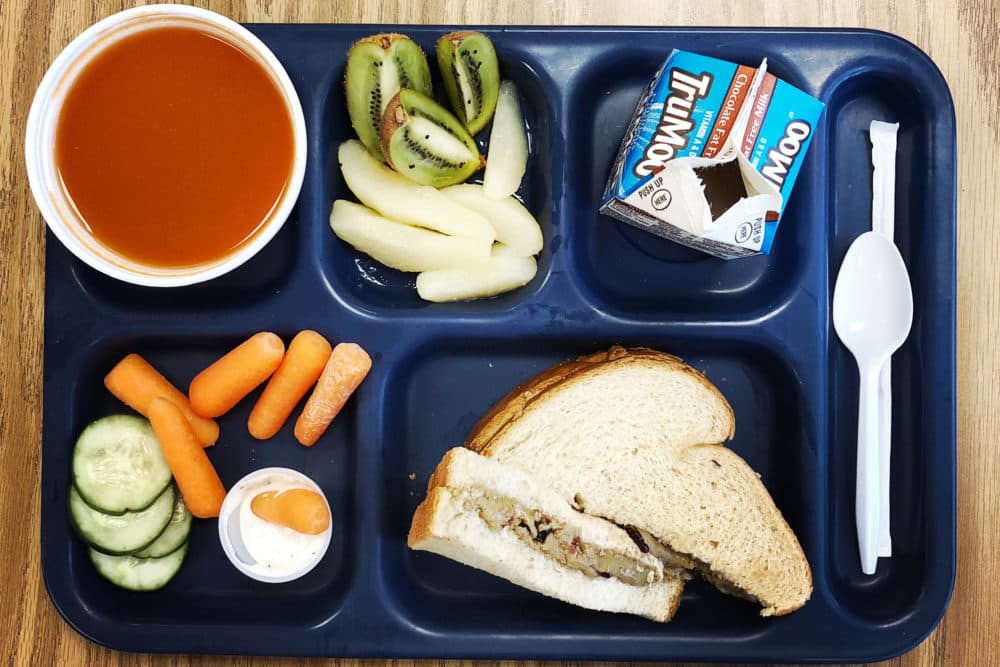Advertisement
Free school meals are back on the menu in proposed Mass. budget

Massachusetts is on track to become one of a handful of states to continue providing free meals for all students next school year, regardless of a family's level of income.
Funding for the initiative is not a done deal yet. The $110 million provision was included in the $52 billion state budget, which has passed both the state House and Senate, and now awaits a signature from Gov. Charlie Baker.
For many advocates in this space, the bill's passage is a huge milestone. If finalized, it would allocate state dollars to subsidize free school meals for 400,000 Massachusetts students next school year.
"It's an investment with huge returns," said Erin McAleer, the director of the anti- hunger Boston-based nonprofit, Project Bread. "Obviously, we want to eventually make this permanent."
But reaching this political compromise took time. And progress occurred in smaller steps.
In 2020, Massachusetts lawmakers passed the "Breakfast After The Bell" bill, which required districts with high rates of poverty to offer free breakfast to qualifying students during first period of school, though the pandemic delayed implementation. Advocates say a combination of unreliable transportation and social stigma kept many students from taking advantage of breakfast before the first bell of the day.
"The next step in the continuum was fighting for universal school meals," said state Rep. Andres Vargas (D). "We know that these meals are critical for our constituents."
The state and the rest of the country experienced a world with universal free school meals starting with the pandemic in 2020 when the federal government issued waivers that allowed schools to provide all students free meals.
But that pandemic-era program expired June 30 when Congress did not reauthorize funding for next school year. Which is why Massachusetts lawmakers stepped in.
"A lot of families have come to depend on this," said state Sen. Sal DiDomenico (D).
DiDomenico added that, while it would have been better with federal support, universal free school meals was a widely-supported initiative in the Massachusetts state legislature — especially since the current budget line item only covers one year.
Past legislation lay the groundwork
DiDomenico also thinks that previous investments in Massachusetts public schools, like the Student Opportunity Act of 2019, helped lay the groundwork to generate support for this proposal.
"If our kids are coming to school hungry, then they're not ready to learn and take advantage of all the great things we've done for our public school system," he said.
In other words, if the state is going to add $1.5 billion to state education funding, like the law requires, officials also need to make sure that kids are ready to learn.
When kids are properly fed, they can focus better, he said.
And, Vargas added, the benefits of free school meals go beyond the kids themselves.
"It's not just about nutrition of students, but also the economic relief for working parents that send their kids to public schools," he said.
Vargas said many families had come to rely on free school meals since the onset of the pandemic. Taking that away would mean a hard shift, especially for families who are food insecure, but make a little more than 185% of the federal poverty level and do not quite qualify for school nutrition assistance.
School officials are also quick to point out that extending the universal free school meals program is a huge administrative relief because they don't have to re-train staff on the pre-pandemic system that kept track of which students had to pay for school meals and which ones did not.
"We had been preparing to go back to a system that was two-and-a-half years old," said Keith Lavoie, assistant superintendent of operations at the Northborough and Southborough Regional School district. "That was going to be a huge burden not only for our administrative staff and our food services staff, but also our students."
And while there is still a chance Baker could veto the line item for free school meals, most stakeholders are optimistic that it'll make it to the finish line this year.
Advocates and lawmakers said they'll begin efforts to make school food subsidies a permanent fixture in Massachusetts schools as soon as the next legislative session starts.
"With many issues, you start with small steps, but those can eventually get to a big win," said Vargas.
